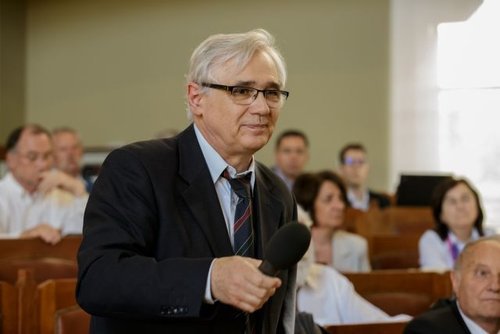Deputy Lay President Sándor Veres has been elected to be the new Lay President of the Danubian Reformed Church District. The election was called due to the death of the former Lay President, László Tőkéczki. Sándor Veres feels that while he is grateful for the support he has received, he will have some big shoes to fill. His goal in his work is to strengthen solidarity among congregations
How did the whole process of becoming Lay President make you feel, including the death of former Lay President László Tőkéczki, your nomination and subsequent election?
– It is not easy for me to talk about this. When László Tőkéczki died, I lost a fellow servant, as well as a teacher and a role model in one person. It is extremely difficult to fill a position when your predecessor was so much more suitable and worthy. In some sense this is a burden. What makes me feel good is the fact that as Lay President I will get the chance to give back some of what I have received before, at least this is what I am going to strive for. As far as the confidence is concerned that has been placed in me by the congregations and the elders, I am filled with gratitude and I thank them for their support.

What do you wish to focus on in your new position?
– I would like for us to put more emphasis on solidarity among congregations, on paying more attention to one another. We must see that the church is one body, but certain congregations feel that they have been left to their own devices, while others believe that they can deal with everything by themselves, without relying on others. Those who require assistance should speak up. And those who are in a position to share what they have should notice those in need. The public church has a crucial role in seeking solutions to this situation, and in providing both personnel and material resources. I truly believe that the image of the church can change significantly if we really pay attention to each other. This is related to a substantial part of my current work, which concerns the building and reconstruction of church buildings, clergy houses and congregation halls. Renovated church buildings, which have a neat appearance and modern heating, are appealing in themselves, because they fit the current needs of people, enabling us to address those living in our vicinity. It is the duty of the church to spread the Gospel to everybody. Our renovated or brand new buildings can become bridges connecting us with those who live in the same neighbourhood, “teaching them to obey everything I have commanded you” (Matt 28:20). Obeying God’s command, I would like to contribute to the development of such bridges.
Sándor Veres is a 68-year-old electrical engineer, elder of Budapest-Csillaghegy Reformed Congregation. He was elected to be the new Lay President of the Danubian Reformed Church District, receiving two hundred and thirty-seven votes out of the two hundred and forty valid ballots. He is also Managing Director of the Church District’s Offices and Convention Centre, as well as a member of the Board of Trustees of the Hungarian Reformed Church Aid Foundation. He is a father of three, and has three grandchildren.
Besides growing congregations, there are also communities that are vanishing. What will be the fate of their buildings?
– No unreasonable renovations should be undertaken, but it must also be avoided that church walls start crumbling down. If the building in question is a memorial, its renovation should be covered from state funds and not from the church’s budget for religious activities. If, on the other hand, a church building is a not a memorial and it no longer has a congregation, we ourselves must demolish it and use the construction materials to erect a new building where it is needed, however painful this may sound. Our primary aim is to have new church buildings built in places where new congregations are also being built at the same time. At present there are ten to fifteen settlements in the Danubian Church District where such a mission has begun: new congregations are being formed with the help of a managing pastor in each place. It is at these sites that we plan to build new churches and congregation halls.
Interview by Márk Hegedűs
Translated by Erzsébet Bölcskei
Photo by Vargosz
The interview was first published in the 21 Oct 2018 issue of “Reformátusok Lapja”